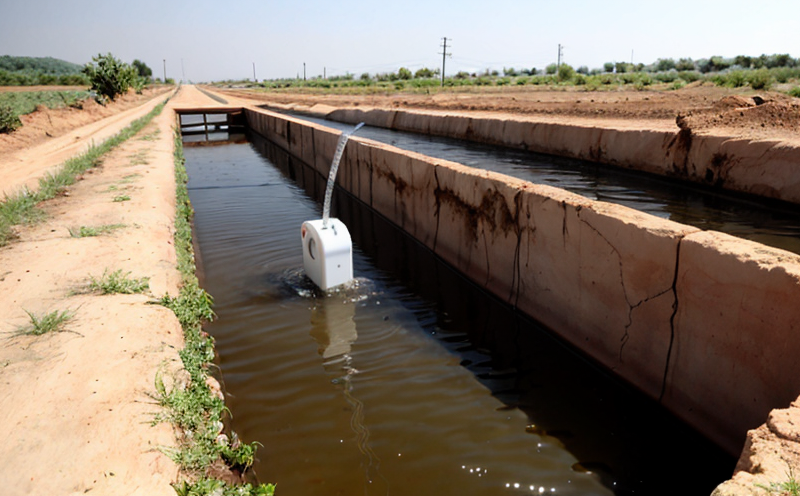ISO 6878 Phosphorus in Water Testing
The ISO 6878 standard provides a robust framework for determining the total phosphorus content in water and wastewater samples. This method is crucial for ensuring compliance with environmental regulations, particularly in mining sectors where groundwater quality is of paramount importance.
Phosphorus contamination can have significant impacts on aquatic ecosystems and human health. In mining operations, it is essential to monitor and control phosphorus levels to prevent downstream pollution and ensure the sustainability of water bodies. The ISO 6878 method offers a standardized approach that is widely accepted by regulatory authorities.
The testing process involves several critical steps, including sample collection, preparation, digestion, and analysis using spectrophotometry or colorimetric methods. The digestion step typically uses strong acids to convert organic phosphorus compounds into inorganic forms, which are then quantified accurately. This method ensures reliable results that can be compared across different laboratories.
The importance of ISO 6878 cannot be overstated for mining operations. By adhering to this standard, companies can ensure they meet stringent environmental regulations and maintain a clean water footprint. The testing process is not only about compliance but also about protecting the environment and ensuring sustainable practices.
Our laboratory employs state-of-the-art equipment and experienced professionals who specialize in ISO 6878 testing. We use precision instruments to achieve accurate results, which are then reported with detailed documentation. This ensures that our clients receive comprehensive reports that they can rely on for decision-making.
The scope of ISO 6878 is broad, covering various types of water samples, including surface waters, groundwaters, and industrial effluents. The method is versatile enough to accommodate different sample matrices, making it a valuable tool across multiple sectors. In the mining industry, this standard plays a pivotal role in safeguarding water resources.
Our laboratory adheres strictly to ISO 6878 guidelines, ensuring that every test is conducted with precision and accuracy. We take pride in providing high-quality results that are not only reliable but also repeatable. This commitment to quality is reflected in our comprehensive approach to sample preparation, digestion, and analysis.
By leveraging the expertise of ISO 6878, we help mining companies maintain compliance with environmental regulations and ensure sustainable practices. Our services go beyond mere testing; they provide valuable insights into water quality that can inform operational decisions and contribute to a cleaner environment.
Applied Standards
The ISO 6878 standard is widely recognized for its comprehensive approach to phosphorus testing in water. This international standard ensures consistency and reliability across different laboratories, making it the preferred choice for regulatory compliance and quality assurance.
- ISO 6878:2014 – This revision introduced improvements in sample preparation and digestion methods, enhancing the accuracy of phosphorus quantification.
- ASTM D3957-18 – This American standard complements ISO 6878 by providing additional guidance on water sample handling and storage.
- EN 2002-4:2015 – The European counterpart of ISO 6878, it offers similar methodologies for phosphorus determination in various water samples.
The application of these standards ensures that our testing process is both rigorous and compliant with international best practices. By adhering to these guidelines, we provide clients with the confidence they need to make informed decisions regarding their water quality management.
Scope and Methodology
The scope of ISO 6878 encompasses a wide range of water samples, including surface waters, groundwaters, and industrial effluents. The method is designed to quantify total phosphorus content in these samples accurately and reliably.
The testing process begins with the collection of representative water samples from various sources within mining operations or other relevant sites. These samples are then prepared for digestion using strong acids to ensure complete conversion of organic phosphorus compounds into inorganic forms. The digestion step is critical as it ensures that all phosphorus species are available for quantification.
Following digestion, the sample is analyzed using spectrophotometric techniques or colorimetric methods. These methods provide precise and accurate measurements of total phosphorus content, allowing for reliable results. The precision and accuracy of these analyses are further enhanced by our use of high-quality reagents and calibrated instruments.
The methodology outlined in ISO 6878 ensures that the testing process is standardized across different laboratories, leading to consistent and comparable results. This standardization is crucial for regulatory compliance and quality assurance purposes.
Quality and Reliability Assurance
- Calibration of Equipment: Our laboratory uses precision instruments that are regularly calibrated using certified standards to ensure accuracy.
- Standard Operating Procedures (SOPs): SOPs are strictly followed to maintain consistency in sample preparation and analysis.
- Quality Control Samples: We include quality control samples in each batch of tests to monitor the precision and accuracy of our results.
- Method Validation: Our testing methods undergo rigorous validation processes to ensure they meet international standards.
These measures are essential for maintaining high-quality results that can be trusted for regulatory compliance and quality assurance. By adhering to these practices, we ensure that our clients receive reliable and accurate test results every time.





